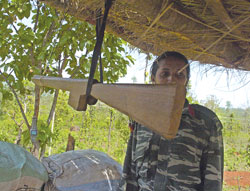|
|
It was clear from the very outset that mainstreaming the Maoists wasn't going to be an easy task: for the Maoists as well as for the rest of the country.
Every conflict leaves a legacy of bad blood and scores are settled. The Northern Ireland peace process took more than a decade to get over entrenched hostilities and finally agree on power sharing this week. Sri Lanka has slipped back into war after three years of ceasefire.
Often in the past year's rollercoaster peace process we in Nepal have been pushed to the brink. Maoist negotiators used the threat of a return to war as an effective bargaining tool in negotiations. The country was sometimes held hostage and Nepalis paid a ransom for peace.
But, such was our desire to see an end to conflict, that we went along with it. Hope hinged on three factors: Indian facilitation, UN monitoring and the watchdog role of civil society. And all this had to be carefully sequenced so that neither the Maoist fighters nor the army generals felt it was a surrender.
Pushpa Kamal Dahal has had to do a precarious high-wire act: balancing the frustrations of former fighters with the need to appear like a mature mainstream politician. Of all the leaders in the Group of Eight, he has the toughest job.
As the Eight meet this week, they should be reminding themselves that this is not about just the mechanics of conducting elections anymore. It is about how to address the ethnic fragmentation threatening us in the aftermath of the insurgency.
Despite YCL guerrillas-in-civvies roughing up someone or criminalised comrades attacking a police post we must remember Dahal is the moderate in this process. We need to help him keep his hotheads in check and try to understand it when he completely contradicts himself from one day to the next.
Last week in Dang, Baburam Bhattarai was heckled by his own party members who wanted to hang on to confiscated property. Now there are grumblings within the Maoists about the Dahal-Bhattarai stewardship of the process. Those who rejoice at an impending implosion in the Maoist party have only to see what happened when the tarai factions splintered off.
The casualties of Dahal's balancing act have been the two sharp censures against the Maoists last week from OHCHR and UNMIN. By laying preconditions for the second round of verification and for continued violence and intimidation, the Maoists crossed a threshold. This could have serious repercussions for the comrades and for the peace process.
As usual when beset with internal dissent, the Maoists look for an external enemy. So it is this time with the ultimatum on republic and the reinstatement of the 'expansionist power' label on India. But most Nepalis are going to see this as rank opportunism on the part of a force that operated out of Indian territory until recently.
It is hard to see where all this is going: the Maoists have alienated just about everyone. Peaceful politics requires a certain level of maturity and tolerance. The Maoist leadership must do all it can to prevent the derailment of the peace train. This time they are its fellow passengers.



